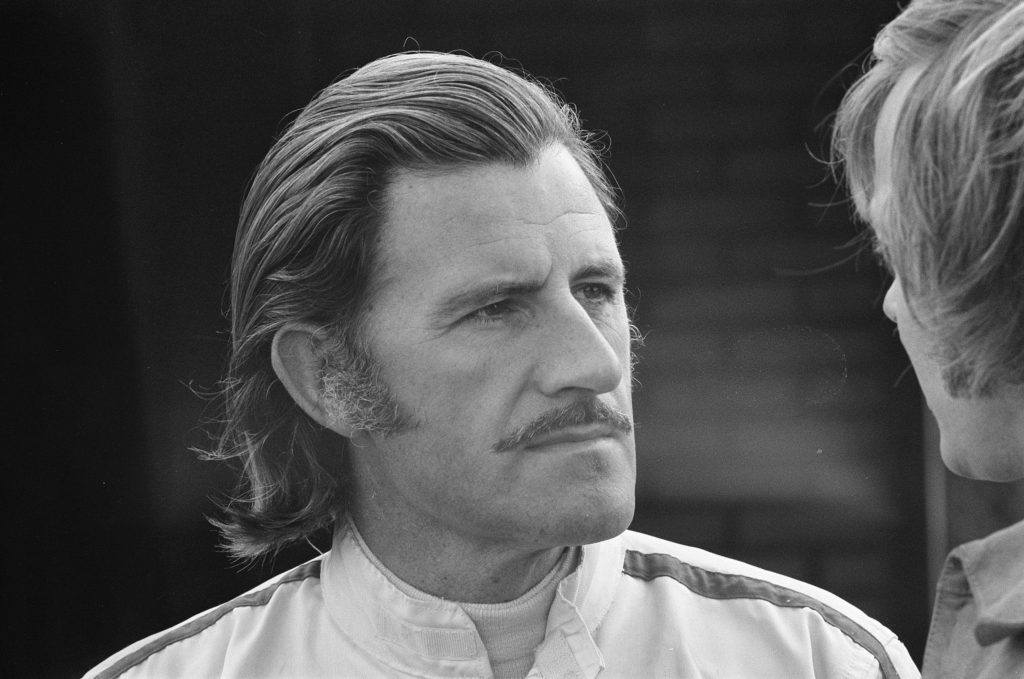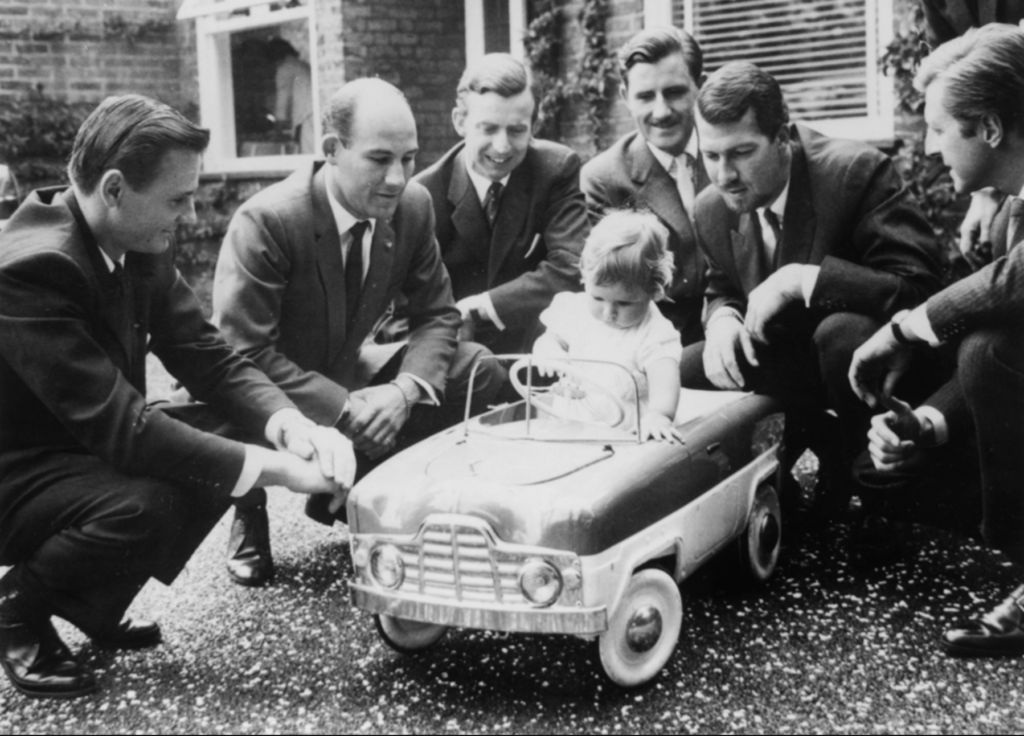In this episode, Damon Hill, 1996 Formula 1 World Champion, opens up about his personal struggles with depression, feelings of inadequacy, loss of identity, and his ultimate path to healing following his remarkable racing career. Damon’s life was given a tragic jolt at 15 years of age when his father and legendary F1 driver Graham Hill died suddenly—the common string that ties together so much of his life and has forged so much of who he is to this day. We discuss Damon’s unique and remarkable racing career including his legendary battles with Michael Schumacher as well as Damon’s firsthand account of what happened that tragic day on May 1st, 1994, when his teammate, Ayrton Senna, died at Imola. But this is not just about racing; rather it’s a human story that’s cloaked in a racing one.
Subscribe on: APPLE PODCASTS | RSS | GOOGLE | OVERCAST | STITCHER
We discuss:
- Graham Hill—Legendary F1 driver (and Damon’s dad), and the high risk of death for F1 drivers in the 1960s [7:40];
- The impact of losing his father to a tragedy [21:45];
- Damon’s path to auto racing [26:15];
- 33 year-old rookie—The unlikely beginning of Damon’s F1 career [40:00];
- Ayrton Senna’s death—Damon’s firsthand account of what happened and why it happened [53:45];
- An out of body experience while racing, and why Damon is uncomfortable with praise [1:24:45];
- The controversy with Michael Schumacher when Damon barely missed winning the championship in 1994 [1:35:15];
- Winning the World Drivers’ Championship in 1996 [1:42:00];
- Damon’s final few years racing, and retirement [1:48:30];
- Struggles after retirement—a “half-cooked” identity, confronting depression, & reorienting perspective [1:53:30];
- What advice might Damon have given his 25-year-old self if he could talk to him now? [2:04:30];
- Does the sport of Formula 1 become less interesting as it gets more and more safe for the drivers? [2:07:00];
- Why Damon likes to read the obituaries of strangers [2:11:15];
- The importance of being a good parent to your kids [2:15:30];
- Living an examined life, unanswered questions, and the importance of knowing your identify [2:18:00]; and
- More.
Get Peter’s expertise in your inbox 100% free.
Sign up to receive An Introductory Guide to Longevity by Peter Attia, weekly longevity-focused articles, and new podcast announcements.
Graham Hill—Legendary F1 driver (and Damon’s dad), and the high risk of death for F1 drivers in the 1960s [7:40]
Peter highly recommends Damon’s book: Watching the Wheels
- Damon says the book wasn’t about his success as a race car driver
- It was more about the emotional struggles that were tangled up in his identity
- Was he motivated to live up to his father’s name? Was this what he really wanted?
“I’m pleased because it’s reached people who have experienced, maybe they’ve been experiencing, depression in some way, or they’ve had some difficulty in their life. And I just wanted to make it clear that it’s never plain sailing if you achieve success in sports or you achieve success in the world. And a lot of people like to gloss over the difficult bits.”
Graham Hill (Damon’s father)

Figure 1. Graham Hill. Image credit: wikipedia.org
- Damon’s father, Graham Hill, was a legendary F1 driver
- Graham is the only person to have won the Triple Crown of Motorsport
- He was a star of the sport, great speaker, impeccably dressed, perfect mustache

Figure 2. Damon Hill sitting in a toy car at his christening watched by Bruce McLaren, Stirling Moss, Tony Brooks, his father Graham Hill, Jo Bonnier and Wolfgang von Trips, July 17, 1961. Image credit: espn.com
High prevalence of driving deaths in F1 during Graham Hill’s era
⇒ Peter’s favorite documentary on F1: 1 (2013 film)
- Graham Hill drove from 1958-1975
- In those days there might have been 26 or so drivers
- Each year about 2 of them would die
- That’s like a ~12% chance of death
- And then you stack those odds year after year
- It’s a miracle that guys like Graham Hill and Jackie Stewart survived
- In 1964 at Indianapolis, drivers Eddie Sachs and Dave MacDonald were killed in the same race yet the competition carried on until it was finished
-Why was the sport (and drivers) so seemingly cavalier about deaths during F1 competitions?
- If you grew up during the war era, you were witness to so many men and women dying in the war
- Flying bombers and fighting the Germans, risking your life
- So racing might be dangerous but it’s also fun and you get paid
- And much better than the alternative of being shot at in war
-A more gentlemanly approach to driving:
- In those days, compared to now, drivers were more careful in terms of not be responsible for another drivers crash
- Since the risk of death from crash was so much higher, the drivers were more “gentlemanly” than they are nowadays
Pushing fear to the back of your mind
- Jackie Stewart wrote in his book about how frequently he would attend funerals of other drivers during his career in the 1960s
- Being a driver means you have to have some ability to push fear to the back of your mind
- Damon recently observed this skill in the documentary, Free Solo, when Alex Honnold climbs El Capitan without a rope
- In 1994, Damon witnessed his teammate, Ayrton Senna, die in a crash at Imola
- But he had to figure out how to push that fear into the back of his mind and keep racing
- It was a very dangerous time to be driving in the 1990s
“If you make an error, then you pay the price, and that’s your fault. So you do concentrate a lot harder when you know that the risk of injury is great.”
The impact of losing his father to a tragedy [21:45]
Graham Hill’s death
- Damon’s father retired from racing in 1975
- It was a “relief” to his family that he survived some a dangerous time to be in motor racing
- However, on November 29th, 1975, just months after retiring, Graham Hill tragically died a plane crash
- In Damon’s book, he describes the nightmare, the phone call, his mom screaming…
- “…we don’t get over things like that. It’s the worst thing that you can imagine happening…”
How therapy can help with these types of trauma:
{end of show notes preview}
Would you like access to extensive show notes and references for this podcast (and more)?
Check out this post to see an example of what the substantial show notes look like. Become a member today to get access.



